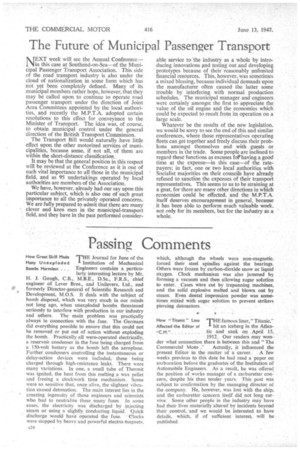The Future of Municipal Passenger Transport
Page 26

If you've noticed an error in this article please click here to report it so we can fix it.
NEXT week will see the Annual Conference— in this case at Southend-on-Sea--of the Municipal Passenger Transport Association. This side of the road transport industry is also under the cloud of nationalization in some form which has not yet been completely defined. Many of its municipal members rather hope, however, that they may be called upon to continue to operate road passenger transport under the direction of Joint Area Committees appointed by the local authorities, and recently the M.P.T.A. adopted certain resolutions to this effect for conveyance to the Minister of Transport. The idea was, of course, to obtain municipal control under the general direction of the British Transport Commission. The Transport Bill would naturally have little effect upon the other motorized services of municipalities, because some, if not all, of them are within the short-distance classification.
It may be that the general position in this respect will be reviewed at the Conference as it is one of such vital importance to all those in the municipal field, and as 95 undertakings operated by local authorities are members of the Association.
We have, however, already had our say upon this particular subject, which is also one of such great importance to all the privately operated concerns. We are fully prepared to admit that there are many clever and keen men in the municipal-transport field, and they have in the past performed consider able service to the industry as a whole by introducing innovations And testing out and developing prototypes because of their reasonably unlimited financial resources. This, however, was sometimes a mixed blessing, because individual demands upon the manufacturer often caused the latter some trouble by interfering with normal production schedules. The municipal manager and engineers were certainly amongst the first to appreciate the value of the oil engine and the economies which could be expected to result from its operation on a large scale.
Whatever be the results of the new legislation, we would be sorry to see the end of this and similar conferences, where those representatives operating fleets can get together and freely discuss their problems amongst themselves and with guests or members in the trade. Some people are inclined to regard these functions as excuses fo? having a good time at the expense—in this case—of the ratepayers; in fact, one or two local authorities with Socialist majorities on their councils have already refused to sanction the expenses of their transport representatives. This seems to us to be straining at a gnat, for there are many other directions in which economies could be effected. and the M.P.T.A. itself deserves encouragement in general, because it has, been able to perform much valuable work. not only for its members, but for the industry as a whole.












































































